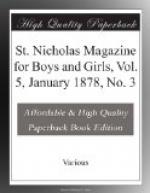“Hi!” cried the boys, both together; “one might be sure you would wish for something silly! What should we do with two girls, indeed?”
“But father said he would bring ‘something nice,’ and I think girls are the very nicest things in the world,” replied Olga, sturdily.
There would certainly have been more serious words, but just then good grandmother Ingeborg called “supper,” and away scampered the hungry little party to their evening meal of brown bread and cream, to which was added, as a treat that night, a bit of goat’s-milk cheese.
During midsummer in Norway the sun does not set for nearly ten weeks, and only when little heads nod, and bright eyes shut and refuse to open, do children know that it is “sleep-time.” So on this day, though the little hearts longed to wait for father’s coming, six heavy lids said “no,” and soon the tired children were sleeping soundly on their sweet, fresh beds of birch-twigs.
[Illustration: Olaf gives Krikel A ride in his sled.]
A few miles beyond Lyngen, on the north, a little colony of wandering Lapps had pitched their tents, some years before our story begins, and finding there a pleasant resting-place, had made it their home, bringing with them their herds of reindeer to feed on the abundant lichens with which the stony fields and hill-side trees were covered. Somewhat apart from the little cluster of tents stood one, quite pretentious, where dwelt Haakon, the wealthiest Lapp of all the tribe. He counted his reindeer by hundreds, and in his tent, half buried in the ground for safe keeping, were two great chests filled with furs, gay, bright-colored jackets and skirts, beautiful articles of carved bone and wood, and, more valuable than all, a little iron-bound box full of silver marks. For Haakon had married Gunilda, a rich maiden of one of the richest Lapp families, and she had brought these to his tent.
Here, for a while, Gunilda lived a peaceful, happy life. Haakon was kind, and, when baby Niels came to share her love, the days were full of joy and content. She made him a little cradle of green baize bound with bright scarlet, filled with moss as soft and fine as velvet, and covered with a dainty quilt of hare’s-skin. This was hung by a cord to one of the tent-poles, and here the baby rocked for hours, while his mother sang to him quaint, weird songs, that yet were not sad because of the joyous baby laugh that mingled with the notes.
But, alas! after a time Haakon fell into bad habits and grew cruel and hard to Gunilda. Though she spoke no word, her meek eyes reproached him when he let the strong drink, or “finkel,” steal away his senses; and because he could not bear this look, he gave his wife many an unkind word and blow, so that at last her heart was broken. Even baby Hansa, who had come to take Niels’ place in the little cradle, could not comfort her; and, one day, when Haakon was sleeping, stupidly, by the tent-fire, Gunilda kissed her children,—then she, too, slept, but never to waken.




